Whenever the subject of writing about espionage comes up in conversation and I say it’s something I’m interested in, the immediate reaction I’ve come to expect is, “Oh, you mean like James Bond?” It’s actually quite predictable, just as “Oh, like Star Wars?” used to be the usual reaction to me saying I write science fiction … and it’s just as wrong.
This month Tor published Empire Games, the first book in my Empire Games trilogy. It’s a science-fictional spy thriller; so if you can imagine a James Bond movie set in the Star Wars universe? That’s almost exactly not what it’s about.
Espionage is about spies the way that science fiction is about rocket ships or astronomy is about building telescopes: yes, those items feature in the field to some extent, but there’s a lot more to it. Espionage—or more accurately, intelligence-gathering—is about the process of piecing together an accurate picture of a target’s intentions and capabilities, to enable policy-makers (be they corporate or national) to put in place an appropriate response.
It used to be said in the early 20th century that the editor of The Times (of London) had 98 percent of the intelligence available to the head of the Secret Intelligence Service; it was the other 2 percent—the secrets—that frequently made all the difference. But times have changed, and these days the job is not about uncovering information so much as it is about trying to understand what it all means.
Faulty analysis of intelligence can trigger wars and the collapse of governments, poisoning international relations for decades: relatively few Americans today realize that the reason for the continuing hostility of Iran is that in 1953 the CIA overthrew a democratically elected Iranian government, or that Saddam’s invasion of Kuwait in 1993 (and the Argentinian invasion of the Falkland Islands in 1982) were based on faulty intelligence assessments.
And that’s before we get onto the subject of covert operations, in which an organization spreads false information to corrupt a rival’s intelligence feed and obtain political advantage. 2016 gave us a jaw-dropping demonstration of this, worked out in public. It’s relatively cheap to generate and disseminate false news and black propaganda. In fact, in the internet age, it can be a profitable cottage industry: teenagers in Veles, Macedonia latched onto the febrile atmosphere of the 2016 presidential campaign to invent and spread outrageous rumors (often plagiarized from conspiracy blogs) in order to capitalize on the advertising revenue it generated. Who needs the KGB as a bogeyman when irresponsible foreign teens on social media can throw an election? And this gets us right back to the conundrum of how to understand what the news (and intelligence is news) means, whether it’s true or false, and if false, then whose agenda it serves.
I’ve had a lifelong fascination with the machinery of espionage, and I thought I’d recommend a few nonfiction titles that provide some insights into how it works. But be warned: there’s very little James Bond in here (although some of the CIA’s more bizarre experiments during the 1960s are definitely worthy of “Q”).
The Agency: The Rise and Decline of the CIA by John Ranelagh
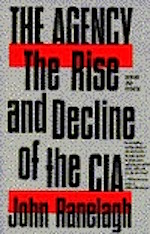 Ranelagh has become the unofficial historian of the CIA and The Agency, published at the height of the Cold War, was his first, monumental history of the rise of the organization: from its roots in the wartime OSS, through its ascendancy in the 1950s, its transformation into a government bureaucracy and intelligence analysis operation, the shift towards electronic intelligence gathering in the 1960s, the U2 program and Vietnam, and on to the post-Watergate enquiry into CIA black operations by the Church Commission in the mid to late 1970s.
Ranelagh has become the unofficial historian of the CIA and The Agency, published at the height of the Cold War, was his first, monumental history of the rise of the organization: from its roots in the wartime OSS, through its ascendancy in the 1950s, its transformation into a government bureaucracy and intelligence analysis operation, the shift towards electronic intelligence gathering in the 1960s, the U2 program and Vietnam, and on to the post-Watergate enquiry into CIA black operations by the Church Commission in the mid to late 1970s.
There are more recent books on the subject (including the author’s own CIA: A History), but this was the first to break the myth of the Company’s slick public presentation and reveal it as another bumbling Washington bureaucracy … but one that had toppled governments, repeatedly tried to assassinate Fidel Castro (with everything from exploding cigars to poisoned boot polish), and dosed an elephant with LSD (because every government bureaucracy needs elephants on acid).
Memoirs of a Spymaster by Markus Wolf
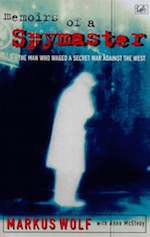 The second-oldest profession has been accompanied by a peculiar sub-genre of confessional autobiography since its inception, in which a former adversary bares all to explain to the public how their enemies see them. Sometimes these books are written by defectors, milking their experience for sensationalist and alarming content to earn a living in their new home. But this isn’t one of those books. In the wake of the revolutions of 1989, when the Berlin Wall was smashed, the former German Democratic Republic (GDR, or East Germany) underwent a traumatic reunification with West Germany. Many of the former Communist state’s politicians and civil servants were disgraced or even prosecuted: they became involuntary exiles in the west, and some of them chose to tell their tale.
The second-oldest profession has been accompanied by a peculiar sub-genre of confessional autobiography since its inception, in which a former adversary bares all to explain to the public how their enemies see them. Sometimes these books are written by defectors, milking their experience for sensationalist and alarming content to earn a living in their new home. But this isn’t one of those books. In the wake of the revolutions of 1989, when the Berlin Wall was smashed, the former German Democratic Republic (GDR, or East Germany) underwent a traumatic reunification with West Germany. Many of the former Communist state’s politicians and civil servants were disgraced or even prosecuted: they became involuntary exiles in the west, and some of them chose to tell their tale.
Markus “Mischa” Wolf was head of the foreign intelligence division of East Germany’s Ministry for State Security, the Stasi, from 1953 to 1986. His fiefdom was a smaller, more agile agency than the lumbering behemoths of Soviet intelligence, the KGB and GRU: and his successes as a spymaster were legendary. In the 1960s and 1970s, he riddled the top echelons of West German industry and government with spies, even managing to insert an agent as private secretary to the West German Chancellor, Willy Brandt. Working with much more limited resources than the Soviet foreign intel apparatus, Wolf’s organization achieved something of a reputation as an elite espionage agency. And to this day, whenever I ask historians of Cold War espionage what the Stasi were doing on US soil, the answer I get is “we’re sure they were up to something, but we don’t actually know …”
The Code-Breakers by David Kahn
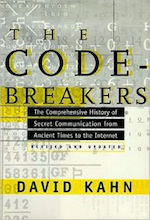 Codes and cyphers: these days encryption is part of our everyday internet hygiene, but before the early 1990s it was a recondite, esoteric field of obsessive interest to spooks and governments who were of the opinion that civilians had no business being able to communicate secretly.
Codes and cyphers: these days encryption is part of our everyday internet hygiene, but before the early 1990s it was a recondite, esoteric field of obsessive interest to spooks and governments who were of the opinion that civilians had no business being able to communicate secretly.
This book is a magisterial history of the field, from the ancient origins of secret writing through to the dawn of the internet age. Along the way it gives us a particularly American perspective on the history of the Black Chamber—a secretive codebreaking operation run out of the back rooms of the State Department until it was disbanded in the 1920s by Secretary of State Henry Stimson, who declared “Gentlemen do not read each other’s mail”—through its hasty wartime revival, the breaking of the Imperial Japanese Navy codes, and the subsequent formal establishment of the National Security Agency.
Body of Secrets by James Bamford
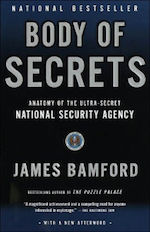 From its inception in 1952, the NSA served as the signals and cryptographic intelligence arm of the US government in near-complete secrecy, its very name classified until the early 1980s. Then, working from public sources, FOIA notices, and interviews with retired former personnel, James Bamford blew the doors off it in his expose, The Puzzle Palace: Inside the National Security Agency, America’s Most Secret Intelligence Operation. He’d first run across the agency in the 1970s when, in the Navy, he stumbled across a program that was illegally eavesdropping on US citizens: after testifying before the Church Commission he made it his life’s work to unearth as much information as he could about the agency, and today he has more or less become its unofficial official historian.
From its inception in 1952, the NSA served as the signals and cryptographic intelligence arm of the US government in near-complete secrecy, its very name classified until the early 1980s. Then, working from public sources, FOIA notices, and interviews with retired former personnel, James Bamford blew the doors off it in his expose, The Puzzle Palace: Inside the National Security Agency, America’s Most Secret Intelligence Operation. He’d first run across the agency in the 1970s when, in the Navy, he stumbled across a program that was illegally eavesdropping on US citizens: after testifying before the Church Commission he made it his life’s work to unearth as much information as he could about the agency, and today he has more or less become its unofficial official historian.
Everyone knows about the CIA, but the NSA is bigger, more secretive, and vastly more powerful in the internet age. It’s only since 2012-13 and Edward Snowden’s dissemination of a vast trove of documents via Wikileaks that we’ve learned just how pervasive the NSA is in today’s world. But where did it come from, and how did it get to this point?
Body of Secrets updates and expands Bamford’s earlier book, with the improved access that became possible once the Cold War was definitively over, and takes his history of the NSA from its inception through to the internet age, culminating in an account of the NSA personnel monitoring the communications between hijacked airliners and air traffic control on 9/11. Along the way, we get a look at a very different kind of espionage agency, where the spies work at computers in cubicle farms or sweat over network cables in huge data centers rather than breaking into embassies and bribing foreign civil servants to obtain kompromat. Because this is how the game is played today, and this is the agency that has shaped the state of security on the internet (and forced software vendors to leave open all those annoying back doors that allow snoopers—and hackers—to gain access to your laptop or phone).
The New Spies by James Adams
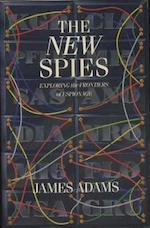 The four preceding books have all been either histories of espionage practices and agencies, or an autobiography with a large chunk of history embedded within it: but what they all have in common is that they’re examinations of the world of secret intelligence gathering told from the inside looking out.
The four preceding books have all been either histories of espionage practices and agencies, or an autobiography with a large chunk of history embedded within it: but what they all have in common is that they’re examinations of the world of secret intelligence gathering told from the inside looking out.
The New Spies, written by a former Washington Bureau Chief for the UK’s Sunday Times newspaper, is something else. Adams takes the perspective that espionage is a global industry with a turnover in 1990 on the order of $50Bn a year (today it’s considerably larger). While the Cold War agencies used the existential confrontation between east and west to justify their existence, they conducted operations on a fairly predictable basis, against identifiable adversaries. But with the collapse of Communism in Eastern Europe and the disintegration of the USSR, the large organizations that existed to serve this purpose didn’t simply wind up their operations and cease to exist. As with any large organization that reaches the end of a long campaign, the people who work there look for a new reason to exist: and so, even as the Soviet experts were facing retirement and the career scrap heap, the institutions in the west—from the CIA and NSA to the UK’s MI5 and GCHQ—began to look for new missions to justify their budget and their existence. Even before the dust from the Cold War had settled, The New Spies successfully identified terrorism, drugs trafficking, and economic espionage as a major focus for the future of these vast bureaucratic empires, then examines the structural changes the agencies undertook in order to retain relevance in a changing world.
While a book discussing the survival of the CIA into the post-Cold War age might seem a little dated at this point, it’s worth bearing in mind that while the missions may change, the organizations themselves continue to exist as vast civil service enterprises: and the way they approach any given problem reflects their institutional culture. As new tasks are identified, the intelligence industry will address them in accordance with their existing practices (an approach I used in planning the background of Empire Games).
 Charles Stross was born in Leeds, England, in 1964. He has worked as a pharmacist, software engineer, and freelance journalist, but now writes full-time. To date, Stross has won two Hugo Awards and been nominated twelve times. He has also won the Locus Award for Best Novel, the Locus Award for Best Novella, and has been shortlisted for the Arthur C. Clarke and Nebula Awards. His latest book, Empire Games, is now available from Tor Books. You can visit his blog, follow his Facebook page, or find him on Twitter at @cstross.
Charles Stross was born in Leeds, England, in 1964. He has worked as a pharmacist, software engineer, and freelance journalist, but now writes full-time. To date, Stross has won two Hugo Awards and been nominated twelve times. He has also won the Locus Award for Best Novel, the Locus Award for Best Novella, and has been shortlisted for the Arthur C. Clarke and Nebula Awards. His latest book, Empire Games, is now available from Tor Books. You can visit his blog, follow his Facebook page, or find him on Twitter at @cstross.










It’s about 30 years out of date but if you can find it Deep Black is a good history of spy satellites and aircraft.
Blind Man’s Bluff , about the use of submarines in espionage, is only about 20 years out of date, but still interesting.
Today the U-2 is still in use, the SR-71 is a museum piece, and if you have the math you can ask yourself “What would the Hubble see if it was pointing the other way, and in a 90 mile orbit?”
Correction: Iraq invaded Kuwait in August 1990, not 1993. (I need to remember that because it was just days before my wedding.)
David Kahn is a long-respected historian of intelligence, worthy of praise.
A recent book on a little-understood bit of espionage history is The Zimmermann Telegram: Intelligence, Diplomacy, and America’s Entry into World War I by Thomas Boghardt. The author updates the now-outdated classic on the subject by Barbara Tuchman. The most interesting part is how the British had to find a way to pass on classified intelligence to the Americans without revealing either that they had cracked German codes or that they were also reading American signals.
Awww… you stuck to nonfiction. I was hoping to hear more about what you like in spy novels, other than the influences you’ve listed for the Laundry Files: Deighton, Fleming, Le Carre, etc.
For SF/F spying, I have some favorites:
Declare, by Tim Powers, is on my short list for all-time best modern fantasy. Weird, cool, and you find yourself nodding, “ah, so that’s what really happened,” when you find out that supernatural forces influenced spies and politics back to the time of Lawrence, through WWII and the cold war.
Cryptonomicon, by Neal Stephenson, is less about spies than codes and intelligence, but also a lot of fun… if you are a fan of Stephenson’s digressions (the care and feeding of business suits here is a classic of the form).
Keith Laumer’s Retief books are supposedly about a diplomat, but then that was often Bond’s cover too. Classic, hilarious, everybody needs to read these.
Class 11 is also a great book about espionage. It’s about CIA training for members so it doesn’t talk about any operations, but it’s still a fascinating read.
Like pre-Snowden NSA, the NRO doesn’t get talked about much either (despite being crucial for modern satellite intelligence gathering).
Confusing pronouns below.
Suppose a person has had the sense, for years, that they’re being used as a tool and not by good guys – that someones are out to grow a villain or the appearance of one, and you’re their chosen raw material – or perhaps they’re just being cartoon villains using you as the tethered goat, trying to make you call out so they can catch someone larger. And they are chipping away at your connections to society, and working at preventing you from forming new ones. And, possibly, sending people out in your stead who might be mistaken for you, to act offensively.
You’re not willing to accept this role. Is there a move you can make, that will not serve their aims?
Clearly, this scenario is hard to believe. So, a hypothetical: if it was really happening to someone, what would be the right thing for that normal, socially responsible person to do?
#6,7 – Are you asking for a friend? :)
One possibility is to try to determine the objectives of the villains and then make significant changes to one’s life that would prevent the objectives from being achieved. If their plans are local, get a new job in a new city and move. If that would further their goals by breaking more social connections, find new, potentially out of character, opportunities. Less privacy, not more, would be helpful here. Withdrawing and hiding would be counter-productive. Join a church and volunteer. Get involved in a community theater group. Join book clubs. Be out in the world in such a way that can’t be mistaken.
The end of the Cold War provided some very interesting revelations for how effective the Soviet espionage was compared to the West. Maybe it was that we thought it was all James Bond or that our technical superiority was enough to make us successful, but looking at KGB files after the USSR broke up make it clear that more often than not we got smoked by the Russians. We had some successes, but lots and lots of failures.
@8 If you want a look at the mind of a GRU operative I would suggest Inside The Aquarium; The making of a Soviet Spy, by Victor Suvorov. He is was a defector from the USSR’s Vienna consulate. He has 2 other books, one on Spetsnaz, and another, the declassified portion of his debriefing on how the GRU was organized.
As one example of the difference between real and fictional spies, The GRU would send a potential agent on a trip incountry and watch what happened at the checkpoints. If the individual was questioned or searched he was dropped from candidacy. Invisibility is the talent most sought out by the GRU and once they are active they rarely touch a gun.
Tka tka tka!!! You forgot the way the British and the US spy agencies colluded to fulfill their political masters’ demands with sexing up the Iraq WMD dossier and suchlike, and then adopted wholesale techniques of cruel and unusual punishment for the crime of being human though not of the persuasion of the ruling party of the US-UK Collusion. The story of that has yet to be told and the guilty parties duly hung by the neck until dead.
I believe this may jog your memory:
Prelude To The Coronation: Some Assembly Required
http://pandora.nla.gov.au/pan/10063/20160404-0202/www.antisf.com.au/the-stories/prelude-to-the-coronation-some-assembly-required.html
Of course, now that Hank Tomlinson has spilled the beans, nobody believes anything anyone in Intelligence says.
And that’s forgetting the crimes of the School of the Americas, the CIA-financed overthrow of Salvador Allende in Chile – read Isabel Allende’s Paula for one description of it …
Well, you can say that. Or you can say that if not for that coup, Iran would have been anti-American throughout most of the Cold War, but since 1979 it would have been as pro-American as the Taliban, Al-Qaeda or the Islamic State. But saying the first thing makes you sound smarter (and morally superior) to the CIA, and saying the second thing does not, so far more people prefer to say the first. Not that I am cynical at all…
He had access to millions of people who could pass for German because they were German, and could blackmail millions of people in West Germany by threatening their relatives in East Germany. (But East Germany itself was a hard espionage target because it was a totalitarian police state.) Hence, all his successes were against West Germany.
If he had major operations against the United States, they were clearly unknown to his own collegues in the Stasi, all of whom were available to be debriefed by the West Germans after the Cold War, unknown to his superiors in the East German government, who were also available to be debriefed, and unknown to their own masters in the KGB. (Vasili Mitrokhin, the KGBs chief archivist, defected to Britain in 1991 and took a lorry load of notes with him, and it seems they too mention no major Stasi operations in the US.)
Just finished reading “Into the Black” by Rowland White, in which the NRO features to some extent. Need to check out the bibliography for other titles relating to the Blue Cube
kind of surprised to see David Kahn’s book listed. He’s not one of the more “high profile” writers who usually get the attention, but he knows his field. Him and David Hoffman are great alone for the obsessive detail they put in their footnotes.
I would also suggest a memoir from an undercover CIA officer’s wife titled, Six Car Lengths Behind an Elephant: Undercover & Overwhelmed as a CIA Wife and Mother by Lillian McCloy. It is a very illuminating and often humorous account of what it was like to be his wife, and the mother of three kids, during the Cold War. It’s a light read, filled with anecdotes about their adventures and experiences as the family moved around the world.
Spy/Counterspy, by Dusko Popov, an autobiographical work by a double (or perhaps triple) agent during WWII. Throws interesting light on the origins of James Bond (Fleming makes an appearance) , and the connections between hoover and Perl Harbor. Short and thrilling, well worth a read.